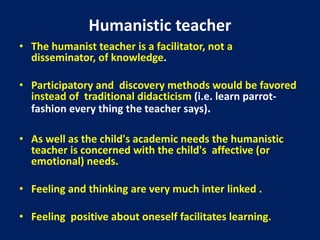Humanistic curriculum
- 1. Humanistic Curriculum Dr.A.Thangasamy Assistant Professor Department of Education Gandhigram Rural Institute Gandhigram.
- 2. • A humanistic curriculum is a curriculum based on intercultural education that allows for the plurality of society while striving to ensure a balance between pluralism and universal values. • A humanistic curriculum is also a curriculum that works for the common good.
- 3. • In a humanistic curriculum, the development of self is the ultimate objective of learning. • It stresses the whole person and the integration of thinking, feeling and doing. • It considers the cognitive, affective and psychomotor domains to be interconnected and must be addressed in the curriculum. • It stresses the development of positive self- concept and interpersonal skills.
- 4. • The humanistic approach considers the formal or planned curriculum and the informal or hidden curriculum. • This approach is rooted in the progressive philosophy and child-centered movement. • It considers the whole child and believes that in curriculum the total development of the individual is the prime consideration.
- 5. Psychological basis of humanistic curriculum • Humanistic education (also called person-centered education) is an approach to education based on the work of humanistic psychologists, most notably Abraham Maslow and Carl Rogers. • Carl Rogers has been called the "Father of Humanistic Psychology" and devoted much of his efforts toward applying the results of his psychological research to person-centered teaching where empathy, caring about students, and genuineness on the part of the learning facilitator were found to be the key traits of the most effective teacher.
- 6. • Maslow’s Theory of self-actualization explains that a person who achieves self-actualization is accepting of self, others and nature, is simple, spontaneous and natural, is open to different experience; possesses empathy and sympathy towards the less fortunate, among many others. • The person can achieve this state of self- actualization later in life but has to start the process while still in school.
- 7. • A basic premise of humanistic pedagogical frameworks is that curricula focused solely on academics is incomplete, and that it is the responsibility of teachers to address the needs of the whole child, including social and emotional learning
- 8. Characteristics • The learner as human being has prime significance for the Humanistic Curriculum which aims at development and realization of complete human personality of the student. • The humanistic curriculum does not take student as subservient to society, history or philosophy, but as a complete entity.
- 9. • The humanistic curriculum experts suggest that if education succeeds in development of needs, interests, and aptitudes of every individual, the students will willingly and intelligently cooperate with one another for common good. • This will ensure a free and universal society with shared interests rather than conflicting ones.
- 10. • humanists stress on individual freedom and democratic rights to form global community based on “common humanity of all people”. • The Humanistic Curriculum is based on the belief that the education that is good for a person is also best for the well being of the nation.
- 11. • Here, the individual learner is not regarded as a passive or at least easily managed recipient of input. • To design the Humanistic Curriculum, we have to focus on the question “What does the curriculum mean to the learner?”
- 12. • Self-understanding, self-actualization, and fostering the emotional and physical well being as well as the intellectual skills necessary for independent judgment become the immediate concern of the Humanistic Curriculum. • To the humanists, the goals of education are related to the ideals of personal growth, integrity, and autonomy.
- 13. • Healthier attitudes towards self, peers, and learning are among their expectations. • The concept of confluent curriculum and curriculum for consciousness are the important types of humanistic curriculum.
- 14. Humanistic teacher • The humanist teacher is a facilitator, not a disseminator, of knowledge. • Participatory and discovery methods would be favored instead of traditional didacticism (i.e. learn parrot- fashion every thing the teacher says). • As well as the child's academic needs the humanistic teacher is concerned with the child's affective (or emotional) needs. • Feeling and thinking are very much inter linked . • Feeling positive about oneself facilitates learning.
- 15. • Much of a humanist teacher's effort would be put into developing a child's self-esteem. It would be important for children to feel good about themselves (high self-esteem), and to feel that they can set and achieve appropriate goals (high self-efficacy). • This form of education is known as child- centered and is typified by the child taking responsibility.
- 16. • Inforcement such as praise, and punishment is the form of negative criticism. Both praise and blame are rejected by the humanists. • Children can become addicted to praise, and put much effort into receiving praise from their teachers. • Such children will often work for the praise, and not work if their efforts go unnoticed.















